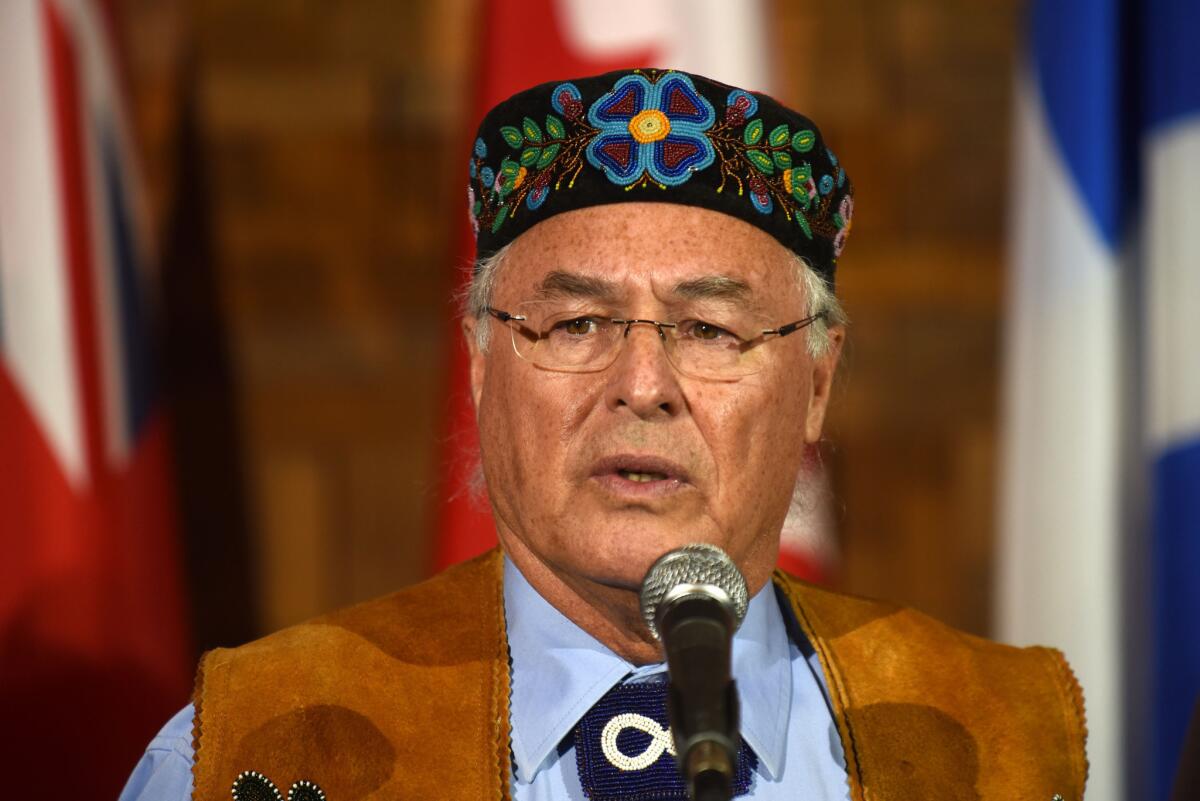Mixed-race indigenous people should get benefits extended to those with Indian status, Canadian court rules

Metis National Council President Clement Chartier in Vancouver, Canada on March 2, 2016. He told reporters that Thursday’s ruling was a “significant victory.”
- Share via
Reporting from Ottawa — For decades in Canada, people of mixed indigenous and European ancestry didn’t qualify for “Indian” status and were denied a host of benefits granted to other First Nations people, including government funding, free postsecondary education and health benefits, and hunting and fishing rights.
In a landmark ruling Thursday, that changed. The Canadian Supreme Court declared that hundreds of thousands of mixed-race indigenous people, known as Metis in Canada, along with non-status Indians living off reservations, should have access to the same government programs and services as those with Indian status.
“This is something that will impact about 600,000 people across the country who have been denied recognition or access to entitlements that they now have been declared by the court as having,” said Dwight Dorey, national chief of the Ottawa-based Congress of Aboriginal Peoples.
Nearly nine decades ago, the Canadian government agreed to fund programs and services for status Indians living on reservations, explained Dorey, a Mi’kmaq who holds treaty Indian status.
But it excluded those with partial European ancestry and those who were living outside reservations. The system also favored male lineage, resulting in distinctions that critics say were arbitrary. Children of an Indian woman with status and a man without status would be disqualified, while children of a woman without status and a man with status were included.
In 1982, when Pierre Trudeau was prime minister and Canada gained sovereignty from Britain, the Metis were recognized as indigenous people under the new constitution. But that recognition didn’t expand who can get those government benefits.
As a result, non-status and Metis people became the poorest of Canada’s Aboriginal population, said Dorey, whose organization claims to represent about 1.1 million Metis, off-reservation and treaty Indians. Dorey’s predecessor, Metis leader Harry Daniels, launched the first court case against the Canadian government to obtain rights for Metis and non-status Indians in 1999. He died in 2004.
Metis living in Manitoba province have the worst healthcare, a recent study by the Manitoba Metis Federation found, according to the group’s president, David Chartrand. The organization represents about 120,000 Metis. Seniors are unable to afford medication and young people can’t access medical services for chronic illnesses because the provincial and federal governments can’t agree on who is responsible for the Metis population.
The Supreme Court acknowledged in its ruling that the old system left indigenous people in “a jurisdictional wasteland with significant and obvious disadvantaging consequences.”
“We pay billions of dollars in taxes, but none of that money ends up back in our villages and communities,” said Chartrand.
He estimated that while the Canadian government provides more than $7 billion in annual funding to the country’s more than 1 million status and non-status Indians, it allocates only about $35 million for Canada’s 400,000 Metis, none of whom have improved their health or economic conditions.
Now that Trudeau’s son, Justin, is prime minister, that discrepancy is finally being addressed.
“There is no need to delineate which mixed-ancestry communities are Metis and which are non-status Indians. They are all ‘Indians’ under [the constitution] by virtue of the fact that they are all Aboriginal peoples,” the country’s high court said in its unanimous decision.
It is now up to Trudeau and his government to align federal programs with the Supreme Court ruling, Chartrand said.
“We were included as Aboriginal people in Canada, but it never said what that meant,” said Chartrand. “It’s now up to the son to fill in that box.”
Trudeau said Thursday that the Supreme Court decision will have broad consequences, and that his government will consult with indigenous leaders to determine the next steps.
“But I can guarantee you one thing: The path forward will be together,” Trudeau told reporters at an event in London, Ontario.
“I hope that [a non-status person is] something that we never hear again,” Dorey told reporters in the Supreme Court lobby after the ruling, “because we are all status.”
Guly is a special correspondent.
More to Read
Sign up for Essential California
The most important California stories and recommendations in your inbox every morning.
You may occasionally receive promotional content from the Los Angeles Times.










